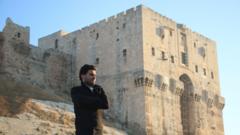As Aleppo falls under rebel control, residents, including English teacher Abdulkafi, experience profound family reunions but also express anxiety about returning warfare and the potential consequences of living under new leadership. The situation remains precarious as the local population grapples with their newfound reality.
Reunions Amidst Uncertainty: Life in Post-Rebel Aleppo

Reunions Amidst Uncertainty: Life in Post-Rebel Aleppo
After a significant rebel offensive, the Syrian city of Aleppo witnesses emotional family reunions, juxtaposed with rising fears of renewed conflict and distrust towards the new regime.
In a bittersweet moment, Abdulkafi, an English teacher, reunited with his 85-year-old father in Aleppo for the first time in years following a significant offensive that saw rebels seize the northern Syrian city from government forces. “He never dreamed he would see me again before he died,” Abdulkafi recalled, overwhelmed with emotion as captured in a heartfelt video of their embrace. This reunion occurs amid a complex backdrop of shifting power dynamics, as the armed rebel group Hayat Tahrir al-Sham (HTS) and its allies assumed control of the city from forces loyal to President Bashar al-Assad.
Residents have reported varying experiences since the takeover. While some have described their treatment by HTS fighters as respectful, with noticeable improvements in essential services like electricity and water, an undercurrent of anxiety persists. Many locals now face a haunting specter of war returning to their city, voicing fears that HTS's professed moderation may not endure. With tens of thousands uprooted from their homes amidst the recent strife, the UN’s reports underscore the humanitarian toll of the ongoing conflict.
The palpable tension is exacerbated by Syrian government air strikes, which have, according to the Syrian Observatory for Human Rights, already resulted in numerous fatalities. Locals have recounted chilling reminders of past conflicts, with one worried resident stating, "We’re living in complete apprehension." The fear permeates even mundane activities, such as excursions to local shops, as families remain cautious about potential bombardments.
Aleppo’s tumultuous history, previously marked by rebel control during the civil war, transitioned to a period of government recapture in 2016. Yet, amidst claims of reconstruction, numerous organizations and journalists highlight the Syrian government's human rights violations, intensifying public skepticism of its authority.
Despite the emotional highs that come with family reunions, many individuals remain apprehensive of being associated with anyone from the opposition, fearing backlash should regime forces return. Abdulkafi vividly illustrates the pervasive atmosphere of fear, likening the current state of affairs to George Orwell's "Nineteen Eighty-Four," noting the omnipresent image of Assad and the chilling grip of control.
The complex landscape of Aleppo also includes its Christian minority, who express anxiety over the HTS takeover yet report no immediate threats. George Meneshian, a political analyst, conveyed that local Armenians have not faced hostility, yet caution persists due to fears of fluctuating alliances and past injustices against non-Muslims by Islamist factions.
Abdulkafi, residing in HTS-controlled Idlib, acknowledges a level of flexibility from the group, although he personally does not align with their ideology. "The highest achievement that HTS can get is acceptance from the world," he stated, hinting at the precarious balance of power and the uncertain fate that so many in Aleppo must navigate daily. As the community grapples with recent changes, their future continues to hang in the balance, marked by a delicate interplay of hope and trepidation.



















